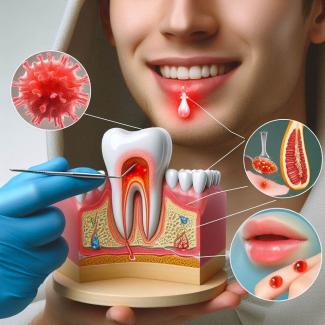
Cloves, scientifically known as Syzygium aromaticum, have been used for centuries as a natural remedy to treat toothache. Their efficacy in alleviating dental pain primarily stems from a compound called eugenol, which possesses several beneficial properties.
How Cloves Affect Pain
- Analgesic Effect:
- Eugenol, the active ingredient in cloves, acts as a natural analgesic. It numbs the nerves in the affected area, reducing pain sensations. This is achieved by blocking the transmission of pain signals to the brain.
- Antiseptic Properties:
- Eugenol has strong antiseptic qualities, which help kill bacteria in the mouth. This is crucial for toothaches caused by bacterial infections, as it helps reduce the infection and prevent it from spreading.
- Anti-inflammatory Properties:
- Eugenol also exhibits anti-inflammatory effects, which help reduce swelling and irritation in the affected area. This can further alleviate pain and discomfort.
How to Use Cloves for Toothache
- Whole Cloves:
- Preparation: Take a whole clove and place it in your mouth, positioning it near the aching tooth.
- Usage: Gently bite down on the clove to release its oil. Avoid chewing it too much to prevent swallowing large pieces. Hold the clove against the painful area for a few minutes until the pain subsides.
- Frequency: You can repeat this process several times a day as needed.
- Clove Oil:
- Preparation: Purchase clove oil from a pharmacy or health food store.
- Usage: Dip a cotton ball or swab into the clove oil. Apply the oil-soaked cotton directly to the aching tooth and surrounding gums.
- Duration: Hold the cotton in place for a few minutes. This process can be repeated several times a day.
- Dilution: If pure clove oil is too strong, you can dilute it with a carrier oil, such as olive oil, in a 1:1 ratio before application.
- Ground Cloves:
- Preparation: Grind whole cloves into a fine powder, or purchase pre-ground cloves.
- Usage: Mix a small amount of ground cloves with a few drops of water or olive oil to form a paste. Apply this paste directly to the aching tooth.
- Duration: Leave the paste on the tooth for several minutes before rinsing your mouth with warm water. Repeat as necessary.
Precautions
- Allergic Reactions: Some individuals may be allergic to eugenol or other components of cloves. Signs of an allergic reaction include rash, itching, swelling, and difficulty breathing. If you experience any of these symptoms, stop using cloves and seek medical attention.
- Overuse: Excessive use of clove oil can cause irritation and damage to oral tissues. Use it sparingly and always dilute it if it feels too strong.
- Temporary Relief: While cloves can provide temporary pain relief, they do not address the underlying cause of a toothache. It is essential to visit a dentist to diagnose and treat the root cause of the pain.
- Children and Pregnant Women: Consult with a healthcare provider before using clove oil for children or if you are pregnant or breastfeeding.
Summary
Cloves are a natural remedy for toothache due to their analgesic, antiseptic, and anti-inflammatory properties, primarily from the eugenol compound. They can be used in various forms, such as whole cloves, clove oil, and ground cloves, to relieve dental pain temporarily. However, professional dental care is necessary to address the underlying cause of the toothache.






